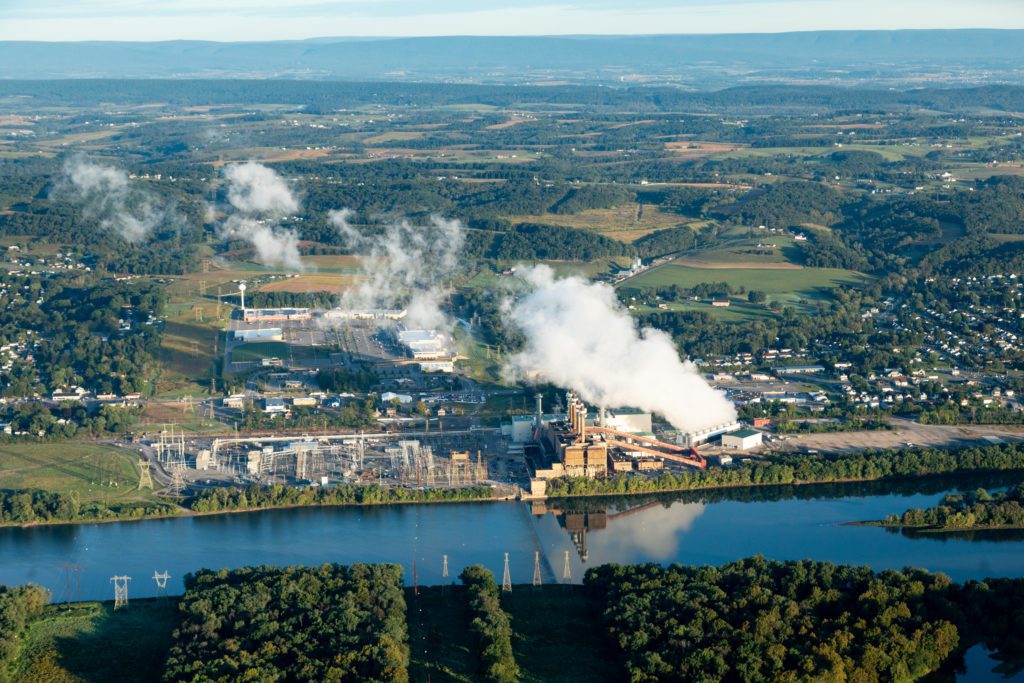Power Plants

Introduction
Fossil fuel power plants are large industrial facilities that burn coal, oil, or gas to generate electricity. There is an increasing number of gas-fired power plants operating in Pennsylvania. While there is a large range in how large these plants are in Pennsylvania and how much electricity they can generate, the larger power plants are enormous projects that are permitted to emit many tons of harmful air pollutants each year. Clean Air Council calls for a rapid transition away from using fossil fuels to create electricity and advocates for policies that address health and climate concerns from these facilities right now.
The Problem
Burning gas to produce electricity results in emissions of smog-forming pollutants, hazardous air pollutants, and greenhouse gases that fuel climate change. Between 2010 and 2017, the electricity generating sector consumed an increasing amount of natural gas and is now the largest consumer of gas, using about half of all gas in Pennsylvania. Gas power plants typically feed electricity directly into the regional electric grid called PJM, which provides electricity to 51 million residents in 13 states and the District of Columbia. Pennsylvania generates the third-highest amount of electricity in the country, produces much more electricity than Pennsylvanians consume, and supplies a significant amount of its excess electricity to the Mid-Atlantic region. Pennsylvania communities do not need new power plants to meet electricity demands and would be burdened with harmful air pollution from these plants.
The Solution
While we push to stop using fossil fuels to generate electricity, we must watchdog current power plants and proposed plants, support communities in addressing their concerns about power plants, and advocate for strong permits, rules, and other measures that reduce harmful pollution now. Frontline communities affected by existing or proposed power plants must be given a greater voice in decisions that affect them. State and local permits for these unnecessary plants must be scrutinized more by the public and challenged if agencies and local governments approve unlawful permits.
Current campaigns
- Renovo Energy Center: Bechtel, a Virginia-based multinational corporation, is proposing to develop the Renovo Energy Center gas-fired power plant in a small community in north central Pennsylvania called Renovo. The Council engaged Renovo residents to submit comments and submitted detailed technical comments critiquing the Pennsylvania Department of Environmental Protection’s (DEP) proposal to issue an air quality permit to the Renovo Energy Center. After the DEP issued the permit, the Council, together with two partner groups, appealed it. The Council is pressing the DEP to follow its public participation policy for environmental justice communities, which it has not been doing. Council staff support a local group of residents in Renovo in raising their concerns about the plant and associated infrastructure to decision makers and other Renovo residents through the media, petitions, and online resources. The Council supports residents in urging the Department of Conservation and Natural Resources to deny approval of the lateral pipeline through state forest that would supply gas to the power plant.
- Allegheny Energy Center: The Allegheny Energy Center, a subsidiary of Invenergy, is proposing to construct a new gas-fired power plant in Elizabeth Township, Allegheny County that would be a major source of air pollution affecting a number of southwestern Pennsylvania communities. Clean Air Council, working with a coalition of environmental organizations, appealed a decision by the Allegheny County Health Department (ACHD) to grant a permit for the construction of this plant. The air permit allows the proposed 639-megawatt power plant to emit hundreds of tons of noxious pollutants and millions of tons of climate pollutants annually. The Council is also supporting a local resident group in educating the community about the negative impacts of the proposed power plant.
Take Action
Ask the DCNR to deny approval to construct the Renovo Energy pipeline on public land
Renovo Energy is planning to construct a 16-inch pipeline through the Sproul State Forest that would provide the natural gas required for the proposed Renovo Energy Center power plant. Sproul is the largest forest in the state forest system, covering 305,450 acres.
Urge the DEP to hold a public hearing before making a final decision about the air permit
In April 2021, the Pennsylvania Department of Environmental Protection (DEP) issued an air quality permit for a proposed large-scale natural gas-fired power plant in Renovo that would be a major source of air pollution for a number of harmful pollutants. However, the DEP denied Renovo residents the opportunity to learn more about and raise concerns about this permit during a public hearing, even though dozens of Renovo residents asked for one.
Recent successes
Robinson Power’s Beech Hollow Power Plant: In September 2021, Clean Air Council, and its partner Environmental Integrity Project successfully defeated the Beech Hollow power plant, a proposed 1,000-megawatt gas-fired power plant in southwest Pennsylvania, when the DEP officially terminated the plant’s permit. If built, the plant would have been an enormous source of dangerous air pollution and greenhouse gases in a region where residents already suffer from some of the worst air quality in the entire United States. The Council and its partner had filed two lawsuits against the power plant and worked with a local group to raise awareness about the air quality impacts of the proposed facility

